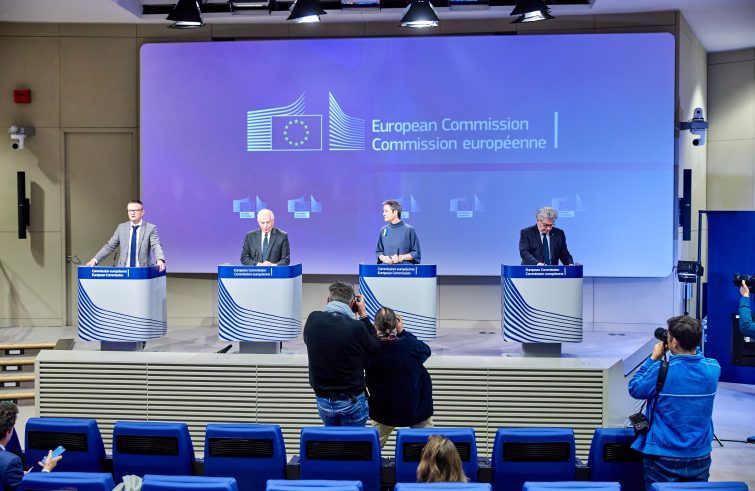
The European Commission has presented its first ever European Defence Industry Programme (EDIP) in the wake of the war in Ukraine and the many conflicts raging inside and surrounding Europe. With a veneer of niceness, it avoids mentioning armaments, but the direction is clear.
 In a statement, Commission Vice-President Margrethe Vestager pointed out: “Today, we adopt a European Defence Industrial Strategy and table a proposal for a European Defence Industry Programme. We do so to respond to changes in Europe’s security paradigm.” The Commissioner went on to say: “Our defence spending goes to too many different weapon systems, primarily bought from outside the EU. Now that defence budgets in all Member States are rising sharply, we should invest better, which largely means investing together, and investing European.”
In a statement, Commission Vice-President Margrethe Vestager pointed out: “Today, we adopt a European Defence Industrial Strategy and table a proposal for a European Defence Industry Programme. We do so to respond to changes in Europe’s security paradigm.” The Commissioner went on to say: “Our defence spending goes to too many different weapon systems, primarily bought from outside the EU. Now that defence budgets in all Member States are rising sharply, we should invest better, which largely means investing together, and investing European.”
“Clear and long-term vision.” The supporting documentation released on 5 March reads: “Two years ago, Russia’s unjustified, on-going war of aggression against Ukraine marked the return of high-intensity conflict on our continent. The European Defence Industrial Strategy (EDIS).” The EDIS sets “a clear, long-term vision to achieve defence industrial readiness in the European Union.” It is worth noting that the Commission has no direct responsibility for defence, which lies with the member states, but it does have a direct competence over the defence industry. Thus, the European Commission is presenting a legislative proposal for a European Defence Industry Programme (EDIP) as a first instrument to deliver the strategy, along with a framework of measures to ensure “the timely availability and supply of defence products.”
Spend more, better and together. “A stronger and more responsive European defence industry will benefit the Member States and ultimately EU citizens. It will also benefit the EU’s key partners, including NATO and Ukraine”, reads the note of the European Commission. In order to increase European defence industrial preparedness, “Member States need to invest more, better, together, and European. Therefore, in order to support the member states (whose armaments expenditure between 2022 and July 2023, according to the Commission, amounted to EUR 100 billion, mostly from the US) in the achievement of these goals, the EU Defence Industry Strategy sets out new actions aming at “supporting a more efficient expression of the Member States’ collective defence demand”; securing the availability of all defence products; Ensuring that national and EU budgets support with the necessary means the adaptation of the European defence industry to the new security context; “mainstreaming a defence readiness culture across policies”; “developing closer ties with Ukraine through its participation in Union initiatives in support of defence industry and stimulating cooperation between the EU and Ukrainian defence industries.” Equally important, is “teaming up with NATO and our strategic, like-minded and international partners, who share the same principles” and requirements. The Commission plans to invest EUR 1.5 billion from the EU budget in the defence industry programme over a three-year period (2025-2027).
Key Indicators. Three indicators are “aimed at measuring Member States’ progress towards industrial readiness. Member States are invited to: procure at least 40 per cent of defence equipment in a collaborative manner by 2030; Ensure that, by 2030, the value of intra-EU defence trade represents at least 35% of the value of the EU defence market; Make steady progress towards procuring at least 50% of their defence procurement budget within the EU by 2030 and 60% by 2035.
 “Strategic imperative”. EU High Representative for Foreign Affairs, Vice-President Josep Borrell, remarked: “Russia’s brutal war of aggression against Ukraine has brought back high intensity warfare to Europe. After decades of under-spending, we must invest more on defence, but we need to do it better and together. A strong, resilient, and competitive European defence industry is a strategic imperative and a pre-condition to enhance our defence readiness. We must also step up our military support to Ukraine, including by supporting its defence industrial base.”
“Strategic imperative”. EU High Representative for Foreign Affairs, Vice-President Josep Borrell, remarked: “Russia’s brutal war of aggression against Ukraine has brought back high intensity warfare to Europe. After decades of under-spending, we must invest more on defence, but we need to do it better and together. A strong, resilient, and competitive European defence industry is a strategic imperative and a pre-condition to enhance our defence readiness. We must also step up our military support to Ukraine, including by supporting its defence industrial base.”
No words are spoken on the subject of peace, to be built with policy and diplomacy – not with arms.











